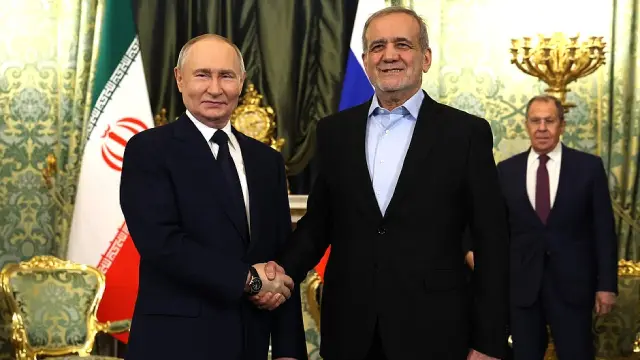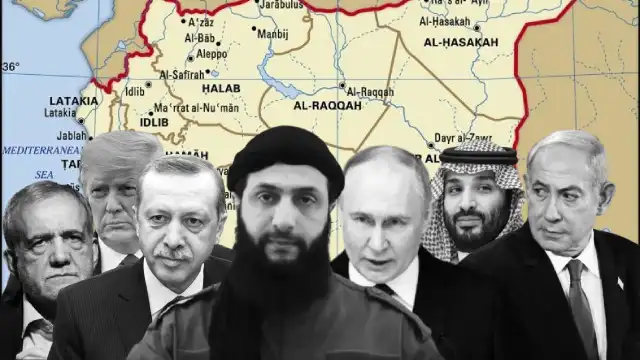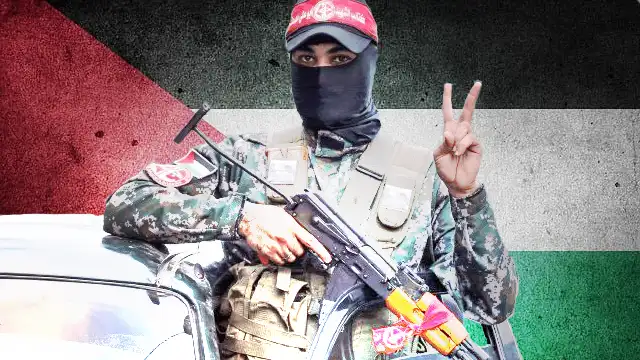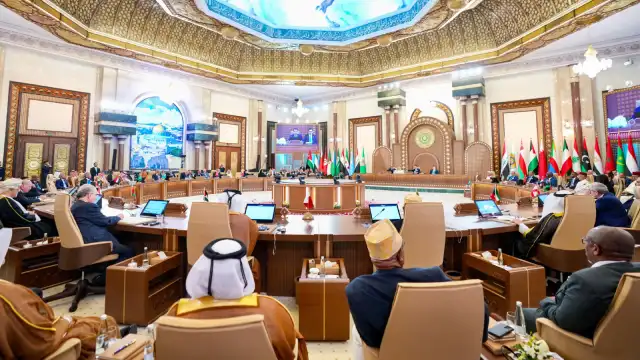While extending an olive branch towards the US-led collective West to revive the Joint Comprehensive Plan of Action (JCPOA), Iranian President Masoud Pezeshkian has signed the Comprehensive Strategic Partnership Agreement with Russia on Friday. The Iran-Russia comprehensive strategic partnership aims to balance regional geopolitical alignments and strengthen the bond between the two energy-rich countries reeling under western sanctions.
The 47-point agreement follows the spirit of the Persia-Soviet treaties, and the subsequent Iran-Russia agreements, and is a crucial step towards de-dollarisation in bilateral trade between the two countries.
Covering aspects from trade and commerce, defence and security, technology, healthcare, education and culture, the Iran-Russia comprehensive strategic partnership has ensured that despite entering the JCPOA, Iran can’t support, in any manner, the US-led collective West in its military expeditions against Russia.
The countries will exert and consolidate their control over the Caspian Sea and it will eventually help Russia strengthen its position in the Caucasian region.
What does the Iran-Russia comprehensive strategic partnership entail?
Facing sanctions from the US-led collective West, both countries have ensured the Iran-Russia comprehensive strategic partnership covers the most crucial sectors of bilateral cooperation, including trade, defence, energy security and protecting sovereignty in the backdrop of an imminent threat of external military aggression.
Defence cooperation in Iran-Russia comprehensive strategic partnership
The Iran-Russia comprehensive strategic partnership marks a significant escalation in military collaboration between the two countries, promising joint exercises, intelligence sharing, and mutual defence against external threats. It explicitly states that neither party will aid the enemies of the other, aiming to deter aggression and strengthen regional security dynamics against the backdrop of US-led sanctions and threats posed by Israel.
The individual defence cooperation agreements will be further signed by both parties in the future, and they will follow the framework that China and Russia have been promoting for the region through the Shanghai Cooperation Organization (SCO).
Their strong defence cooperation will provide a guarantee to Russia that Iran won’t collaborate with the US-led North Atlantic Treaty Organization (NATO) in its military expeditions in Ukraine.
For Iran, the deal ensures that Russia will oppose any act of aggression on its territories by the US-backed Israel in the future, as Tel Aviv entered into a fragile ceasefire deal on Gaza with Hamas.
Iran-Russia transport connectivity
A key focus is enhancing the North-South International Transport Corridor, which provides an alternative route for trade bypassing areas susceptible to Western sanctions. For Iran and Russia, transporting goods, especially fuel, bypassing the sanctions has been challenging. Yet, using the India-controlled Chabahar Port in Iran and the rail-road infrastructure built by China under the Belt-Road Initiative (BRI) in Central Asia, both countries can increase their bilateral trade as well as Iran can escape the volatile Middle East or the Persian Gulf amid rising tensions in the region.
This cooperation aims to streamline the transportation of goods, fostering economic resilience and reducing dependency on routes controlled by sanction-imposing nations.
Iran-Russia comprehensive strategic partnership on bilateral trade and de-dollarisation
The Iran-Russia comprehensive strategic partnership emphasises trading in national currencies, a strategic move towards de-dollarisation that Russia has been promoting through platforms like BRICS. This approach aims to mitigate the impact of the US-led bloc’s sanctions and foster economic sovereignty and stability, allowing both countries to conduct business without the interference of the US or face western volatility.
Energy and nuclear cooperation
The Iran-Russia comprehensive strategic partnership includes plans for technology transfer and joint ventures in oil, gas, and nuclear energy, enhancing energy security and countering geopolitical pressures.
Both countries rely on energy exports for their survival. Although Iran has diversified its economy in the past several years, it relies on oil exports, mostly to China, to earn foreign exchange. The oil sector, which accounts for nearly 8.6% of the Iranian economy, grew by over 16% year-on-year (YoY) in 2023 compared to the non-oil sector, which grew by 3.5% YoY. The oil sector’s growth was due to increased oil exports to China, still, only 55% of the estimated oil revenue was collected in that year.
On the other hand, Russia’s oil supply faces severe sanctions. At the fag end of his tenure, US President Joe Biden imposed more sanctions on Russian energy exports, which helped countries like India.
In this scenario, as both countries tend to work together, they are focusing on nuclear cooperation rather than oil and gas, which will cause more inconvenience to the US.
Russia’s commitment to supporting Iran in civil nuclear power projects for peaceful purposes signals a deepening of energy ties. This could potentially unnerve the West due to proliferation concerns even though the JCPOA remains in the refrigerator.
Security collaboration
Beyond military aspects, the Iran-Russia comprehensive strategic partnership extends to broader security cooperation, including counter-terrorism, cyber-security, and managing transnational crime. Recent incidents of assassinations by Israel within Iranian territories have exposed Tehran’s vulnerability. In this context, the agreement reflects a strategic alignment to tackle shared threats, particularly in light of perceived western and Zionist encroachments, enhancing both nations’ defensive postures.
Information exchange
The Iran-Russia comprehensive strategic partnership commits to cooperation in information security, aiming to protect against cyber threats and misinformation campaigns, often attributed to western and Zionist intelligence operations. This includes sharing expertise and promoting a sovereign internet space, challenging the dominance of American tech giants who control the internet.
Greater cooperation
The overarching theme of the Iran-Russia comprehensive strategic partnership is to forge a multipolar world order where both nations can assert more influence, counter unilateral actions, and diversify their international relations. This comprehensive partnership is a strategic response to the geopolitical challenges posed by sanctions, aiming for a more equitable global playing field.
The challenges to the treaty
The Iran-Russia comprehensive strategic partnership may become a roadblock for Mr Pezeshkian, who, unlike Russian President Vladimir Putin, emphasises collaboration with the West to kickstart Iran’s stagnant economy. Mr Pezeshkian and the moderate camp in Iran have highlighted that Tehran’s reliance on Moscow didn’t help its economy in the long run and the ongoing sanctions prevented large-scale foreign investments and job creation.
While he pursues the diplomatic mission of normalising ties with the US’s president-elect Donald Trump’s incoming administration, Mr Pezeshkian may have to face issues over the Iran-Russia deal. While he can’t undo the Iran-Russia friendship, which has the endorsement of Supreme Leader Sayyed Ali Khamenei, he has to find a middle course to have his way with the West.







